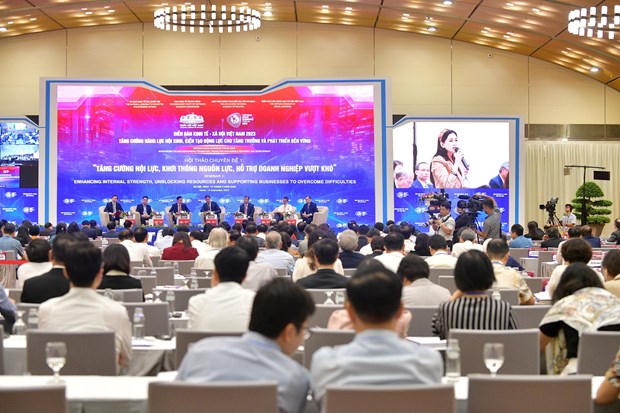 Economy
Economy

 |
| Participants during a panel discussion at the Việt Nam Socio-Economic Forum 2023 in Hà Nội. — VNA/VNS Photo |
HÀ NỘI — Three years since the COVID-19 pandemic, Việt Nam has made significant progress on economic recovery, building a strong foundation and momentum for future growth and development. However, underlying issues remained to be addressed to fully unleash the country's potential, said participants at the Việt Nam Socio-Economic Forum 2023 yesterday in Hà Nội.
Dr Trần Đình Thiên, former head of the Vietnam Institute of Economics, said measures must be taken to end the prolonged declining trend of the economy.
Thiên said while Vietnamese enterprises have proven to be extremely resilient and enduring, they also "grow very slowly and have difficulties reaching maturity". In addition, they tend to have short life spans with approximately 70-75 per cent of them (compared to the number of newly registered businesses) closing down every year.
This year has witnessed a surge in the number of businesses heading toward the exit. During the first eight months of the year, there were 124,700 businesses (against 149,000 newly registered businesses) closed their doors. That's 84 per cent, an increase of 11.3 per cent compared to the same figure from the previous year.
There are a number of paradoxes with the economy such as the economy's difficulties in absorbing capital despite a large demand for it, high GDP growth and low inflation and low inflation and high interest rates at the same time, he said.
The underlying problem, according to Thiên, is resource distribution has not been optimal, resulting in bottlenecking. Thiên advised the government to prioritise the development of a strong market economy, where resources are distributed based on competency.
He proposed building an effective infrastructure system and sound policies to support and unlock the country's economic development potential. There have been significant efforts in recent years in pushing for greater administrative reforms, in visualising the future of Việt Nam's economy and in identifying new growth drivers, he said.
According to Thiên, Việt Nam's net-zero objective by 2050 adopted at COP26 is a good example of the country's new approach to socio-economic development and should remain a top priority in the years to come.
Đậu Anh Tuấn, deputy director-general of the Vietnam Chamber of Commerce and Industry (VCCI), said the country's poor economic infrastructure remained a major obstacle for Vietnamese businesses.
Việt Nam ranks 77th in infrastructure quality, 103rd in roads, 83rd in ports, 103rd in airports and 87th in power supply in the world's ranking, falling behind many of its regional competitors for investment, including China, India, Indonesia, Malaysia and Thailand.
In addition, high production costs remained a major weakness for Vietnamese businesses, hampering their ability to compete, invest and expand. This, in turn, resulted in slow growth and lower employment experienced by the economy.
He proposed stronger incentive programmes to be implemented, especially for businesses in industries with high added value.
Lê Hồng Thủy Tiên from IPPG Group said effective policies are vital to spurring the growth pace of businesses. She proposed the government take action to remove barriers and unnecessary procedures to help businesses cut costs and save time. — VNS